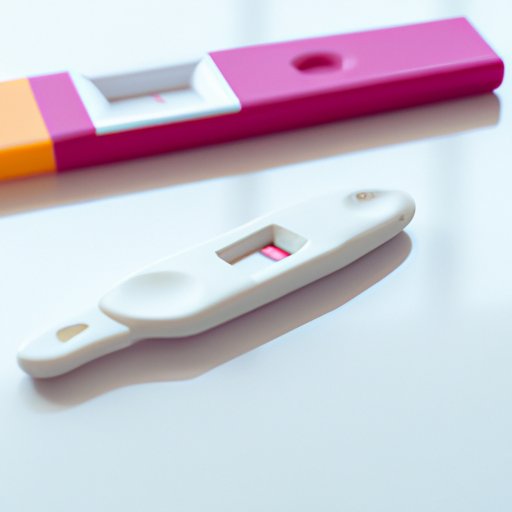Introduction
Pregnancy is the process of carrying a developing fetus in the uterus. It typically lasts for 40 weeks, or 10 lunar months. During this time, your body undergoes many changes to prepare for the birth of your baby. Knowing if you are pregnant as soon as possible can give you the opportunity to make informed decisions about your health and the health of your baby.
Symptoms of Early Pregnancy: How Soon Can You Tell You Are Pregnant?
The earliest signs of pregnancy can vary from woman to woman. Some women may notice these signs as early as two weeks after conception, while others may not experience them until later in the pregnancy. Here are some of the most common physical and emotional signs of early pregnancy.
Common Physical Signs of Early Pregnancy
One of the earliest signs of pregnancy is a missed period. This is usually the first sign that causes women to suspect they may be pregnant. Other physical signs of early pregnancy may include: breast tenderness, fatigue, frequent urination, nausea, and vomiting.
Common Emotional Signs of Early Pregnancy
In addition to physical signs, there are also emotional signs of early pregnancy. These can include mood swings, irritability, anxiety, and depression. Women may also experience increased sensitivity to certain smells, foods, or sounds.
When to Take a Pregnancy Test: How to Know if You’re Pregnant Sooner
If you’re experiencing any of the above signs, it may be time to take a pregnancy test. Home pregnancy tests are available at most drugstores and pharmacies, and they’re usually easy to use.
What is the earliest you can take a pregnancy test?
Most home pregnancy tests are accurate only after the first day of your missed period, although some can detect hCG (the hormone produced by the placenta during pregnancy) as early as seven days after conception.
How accurate are home pregnancy tests?
Home pregnancy tests are generally very accurate, but they can vary in their sensitivity and accuracy. Most tests are over 99% accurate when used correctly. However, if the test is taken too early, it may not detect hCG levels in the urine and produce a false negative result.
The First Signs of Pregnancy: What Should You Look For?
In addition to taking a home pregnancy test, there are other signs of early pregnancy that you should look out for. While every woman experiences pregnancy differently, here are some of the most common physical and emotional signs of early pregnancy.
Physical Signs
Physical signs of early pregnancy can include breast tenderness, fatigue, frequent urination, nausea, and vomiting. Other signs may include darkening of the nipples, a change in appetite, and constipation.
Emotional Signs
Emotional signs of early pregnancy can include mood swings, irritability, anxiety, and depression. Women may also experience increased sensitivity to certain smells, foods, or sounds.
Home Pregnancy Tests: How Reliable Are They?
Home pregnancy tests are generally very reliable when used correctly. However, there are certain factors that can affect the accuracy of a home pregnancy test.
When should you take a home pregnancy test?
Most home pregnancy tests are accurate only after the first day of your missed period. It’s important to wait until your period is late before taking a pregnancy test, as this will increase the accuracy of the results.
What factors can affect the accuracy of a home pregnancy test?
Certain medications, such as fertility drugs, can affect the accuracy of a home pregnancy test. Additionally, using expired tests or using the test incorrectly can also lead to inaccurate results.
Prenatal Screenings: What Tests Can Help You Determine if You’re Pregnant?
In addition to home pregnancy tests, there are other tests that can help you determine if you’re pregnant. These tests are known as prenatal screenings, and they can provide valuable information about your pregnancy.
What types of prenatal screenings are available?
There are several types of prenatal screenings available, including blood tests, ultrasound exams, and amniocentesis. Blood tests can detect hCG levels in the blood, which can help confirm a pregnancy. Ultrasound exams can provide detailed images of the fetus, and amniocentesis can identify genetic disorders.
What information do these tests provide?
Prenatal screenings can provide valuable information about your pregnancy. Blood tests can help confirm a pregnancy, ultrasound exams can provide detailed images of the fetus, and amniocentesis can identify genetic disorders.
Conclusion
Discovering whether or not you are pregnant can be an emotional experience. Understanding the earliest signs of pregnancy, when to take a pregnancy test, and what prenatal screenings are available can help you make informed decisions about your health and the health of your baby. If you think you may be pregnant, it’s important to speak with your doctor or healthcare provider so they can advise you on the best course of action.
(Note: Is this article not meeting your expectations? Do you have knowledge or insights to share? Unlock new opportunities and expand your reach by joining our authors team. Click Registration to join us and share your expertise with our readers.)
